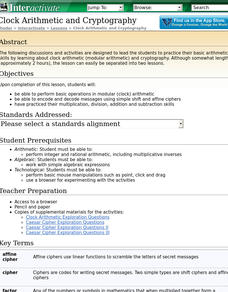Shodor Education Foundation
Surface Area of Rectangular Prism
With this interactive lesson, learners compute the surface area of rectangular prisms. They visit an online investigation applet and record data on the provided handout. Pair this lesson with the volume lesson by the same publisher as an...
Curated OER
Length, Perimeter, and Area
Students explore the concepts of length, perimeter, and area. In this math lesson, students use Shape Explorer to practice finding length, perimeter, and area.
Curated OER
Vocabulary Word Search Puzzle
For this literacy worksheet, students find the words that are in the word search puzzle that focus upon the vocabulary that is from the theme of the sheet.
Curated OER
Quaternions
In this quaternions worksheet, students solve and complete 7 different problems. First, they read and identify quaternions as expressions in a given form of ordinary real numbers. Then, students add and subtract a few problems by doing...
Curated OER
Converting Fractions To Decimals
In this math worksheet, students convert the fractions into decimals for the 18 problems. They are also challenged to convert some mixed numbers.
Curated OER
Clock Arithmetic and Cryptography
High schoolers investigate modular clock arithmetic and cryptography. They perform basic operations in modular (clock) arithmetic and encode and decode messages using simple shift and affine ciphers.
Curated OER
Clock Arithmetic and Cryptography
Students explore the concept of modular arithmetic and cryptography. In this modular arithmetic and cryptography lesson, students use applets to explore modular arithmetic using a clock and Caesar Ciphers. Students exchange their ciphers...
Curated OER
Buying My First Car
Students pretend they are about to buy their first new car. They must do all the calculations necessary to estimate the cost of purchasing the car. They see that the math they learn in school really does have real-life applications.








